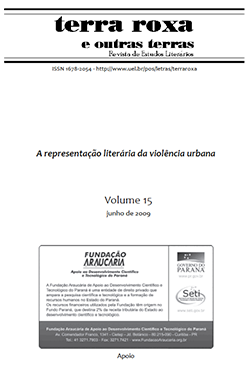“Debaixo da ponte preta”: violence and prejudice
DOI:
https://doi.org/10.5433/1678-2054.2009v15p36Keywords:
Dalton Trevisan, Short story, Violence, PrejudiceAbstract
Dalton Trevisan’s short story “Debaixo da Ponte Preta” tells the Ritinhas’s story – adolescent, black and poor, raped for many men when she went to visit her sister. The violence against women, the prejudice and the poverty are the main subjects of this short story, approached with the sarcastic and cutting view characteristic of daltonian prose.Downloads
References
BAKHTIN, Mikhail. Estética da criação verbal. São Paulo: Martins Fontes, 2003.
CANDIDO, Antonio. A educação pela noite & outros ensaios. São Paulo: Editora Ática, 1989.
CHAUÍ, Marilena. Convite à filosofia. São Paulo: Editora Ática, 2004.
FORTES, Rita Félix, & Maria Beatriz Zanchet. Sabor e saber: o espaço do conto na escola. Foz do Iguaçu: Editora Parque, 2007.
GOTLIB, Nádia Battella. Teoria do conto. São Paulo: Ática, 2006.
RIBEIRO, Darci. O povo brasileiro: a formação e o sentido do Brasil. São Paulo: Companhia das Letras, 1995.
TREVISAN, Dalton. O vampiro de Curitiba. Rio de Janeiro: Record, 1998.
Downloads
Published
How to Cite
Issue
Section
License
Authors who publish in this journal agree to the following terms:
a) The authors retain the copyright and grant the journal the right of first publication, the work being simultaneously licensed under the Creative Commons Attribution-NonCommercial 4.0 International License, allowing the sharing of the work with acknowledgment of the authorship of the work and initial publication in this journal.
b) Authors are authorized to assume additional contracts separately, for non-exclusive distribution of the version of the work published in this journal (eg, publish in an institutional repository or as a book chapter), with acknowledgment of authorship and initial publication in this journal.
c) Authors are allowed and encouraged to publish and distribute their work online (e.g. in institutional repositories or on their personal page) after the editorial process, as this can generate productive changes as well as increase impact and citation of the published work (See The Effect of Open Access).
d) The authors of the approved works authorize the journal to, after publication, transfer their content for reproduction in content indexers, virtual libraries and the like.
e) The authors assume that the texts submitted for publication are of their original creation, taking full responsibility for their content in case of any objection by third parties.



















